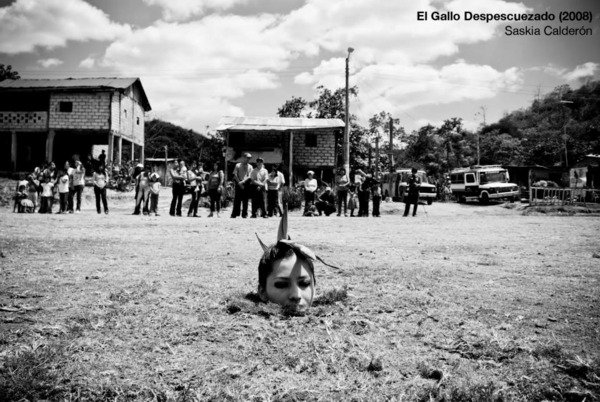12th Bienal de Cuenca
dal 27/3/2014 al 26/6/2014
Segnalato da
Agency
Meriç Algün Ringborg
Armando Andrade Tudela
Julieta Aranda
Martha Araújo
Adrián Balseca
Alessandro Balteo Yazbeck
Néstor Basterretxea
François Bucher
Mauricio Bueno
Saskia Calderón
Pia Camil
Daniel Gustav Cramer
Juan Downey
Patricia Esquivias
Mario García Torres
Ximena Garrido Lecca
José Hidalgo-Anastacio
Runo Lagomarsino
Little Warsaw
Maria Loboda
Claudia Martínez Garay
Benjamin Meyer-Krahmer
Ana Maria Millán
Helen Mirra
Felipe Mujica
Eduardo Navarro
Rivane Neuenschwander
Pedro Neves Marques
Wendelien van Oldenborgh
Juan Pablo Ordóñez
Bernardo Ortiz
Adrian Paci
Rita Ponce de León
Mauro Restiffe
Manuela Ribadeneira
Julia Rometti y Victor Costales
Jorge Satorre
Marinella Senatore
Daniel Steegmann Mangrané
Cecilia Szalkowicz
Sara VanDerBeek
Jacopo Crivelli Visconti
Manuela Moscoso
27/3/2014
12th Bienal de Cuenca
Different Venues, Cuenca
Ir para volver (Leaving to Return). An open thought process in which the artworks form a constellation of independent yet deeply interrelated concepts. The Bienal addresses the suspension of the privileged condition of the artist. While highlighting the state of movement as the key aspect of many artworks included in the exhibition, 'Ir para volver' expression situates Bienal in the undefined field of speech, emphasizing the importance of dialogue and of the mixture of apparently distant, disparate, and even opposed forms of knowledge.

Participants:
Residency program, September 2013–June 2014:
Agency, Helen Mirra, Eduardo Navarro, Julia Rometti and Victor Costales, Jorge Satorre, Marinella Senatore, Sara VanDerBeek
Exhibition, March 28–June 27:
Agency, Meriç Algün Ringborg, Armando Andrade Tudela, Julieta Aranda, Martha Araújo, Adrián Balseca, Alessandro Balteo Yazbeck, Néstor Basterretxea, François Bucher, Mauricio Bueno, Saskia Calderón, Pia Camil, Daniel Gustav Cramer, Juan Downey, Patricia Esquivias, Mario García Torres, Ximena Garrido Lecca, José Hidalgo-Anastacio, Runo Lagomarsino, Little Warsaw, Maria Loboda, Claudia Martínez Garay, Benjamin Meyer-Krahmer, Ana Maria Millán, Helen Mirra, Felipe Mujica, Eduardo Navarro, Rivane Neuenschwander, Pedro Neves Marques, Wendelien van Oldenborgh, Juan Pablo Ordóñez, Bernardo Ortiz, Adrian Paci, Rita Ponce de León, Mauro Restiffe, Manuela Ribadeneira, Julia Rometti y Victor Costales, Jorge Satorre, Marinella Senatore, Daniel Steegmann Mangrané, Cecilia Szalkowicz, Sara VanDerBeek.
Performances, March 28–30:
Saskia Calderón, Juan Pablo Ordóñez, Marinella Senatore
Dialogues, March 29–31:
"Table 1—History, Body, and Aesthetic Condition": Valeria Coronel, Carles Guerra, Max Jorge Hinderer Cruz
"Table 2—Appropriation": Pierre Bal-Blanc, Christian León, Manuel Segade
"Table 3—Of Men and Measure": Sarah Demeuse, Fernanda Laguna, Alexander Provan
"Table 4—Material Movement: Forests": Nabil Ahmed, Mario Melo, Nancy Lee Peluso;
Discussion: Paulo Tavares
Curators: Jacopo Crivelli Visconti (curator), Manuela Moscoso (adjunct curator)
Director of the Fundación Municipal Bienal de Cuenca: Katya Cazar
The 12th Bienal de Cuenca is conceived as an open thought process, in which the artworks form a constellation of independent yet deeply interrelated concepts. Informed by Édouard Glissant's (Martinica, 1928–Paris, 2011) understanding of knowledge as stemming from movement and relation, the Bienal addresses the suspension of the privileged condition of the artist.
In some cases, this results in nomadic artworks, not only because of their physical movement, but also through the outsourcing of creative production to the point of following an almost industrial modus operandi. In other cases, artists recuperate traditional know-how, by working with craftsmen or rescuing fables and forgotten stories, or they reinterpret already existing works and even collaborate with spirits and other-than-human beings. The dissolution of the border between the conceptual and the physical author undermines the bases of economic, geographic and political status quos, often referring, in more or less direct ways, to postcolonial debates and the need to undermine market logic. Problematizing those issues, other artists question the validity of standard and universal measurements of time and space, and point to the impossibility of reducing the world to uniform criteria.
The title of the exhibition is based on the Ecuadorian expression Ir para volver (Leaving to return), which describes a physical and temporary absence (frequently even without a definite duration). While highlighting the state of movement as the key aspect of many artworks included in the exhibition, this expression also situates the 12th Bienal de Cuenca in the undefined field of speech, emphasizing the importance of dialogue and of the mixture of apparently distant, disparate, and even opposed forms of knowledge. Leaving to Return signals an ongoing dialogue that takes place far away from the rigidity of strict and polished discourses, and ultimately delves into life itself.
Dialogues, the discursive program of Leaving to Return, is structured around four of the main concepts of the exhibition. Nabil Ahmed, Sarah Demeuse, Max Jorge Hinderer and Manuel Segade were invited to organize the four table of discussion. On the final day of the program, architect Paulo Tavares will moderate a session that will explore the relation between the topics and the questions raised in the previous days, and articulate a collective dialogue.
Press contact:
Sebastián Lazo T +593 7 2831778 ext. 114 - 115 comunicacion@bienaldecuenca.org
Venues:
Museo de Arte Moderno
Salón del Pueblo
Proceso Arte Contemporáneo
Casa de los Arcos
Capilla del Museo de la Medicina
Colegio Benigno Malo



